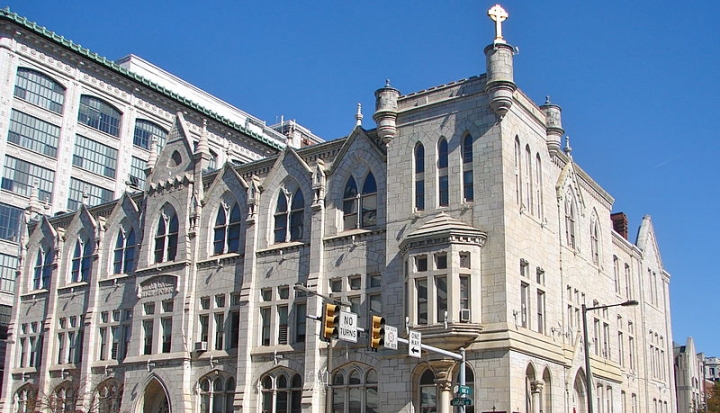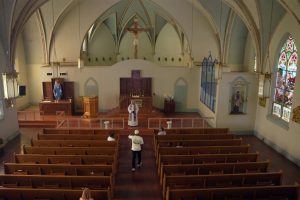In a city where both the public and Catholic school systems have been going broke, Archbishop Charles Chaput of Philadelphia made a deal with a millionaire former CEO of a health insurance company to save the archdiocesan schools.
The news broke August 21, 2012 that Chaput had signed a five-year agreement with the brand new Faith in the Future Foundation, which would take control of management of the archdiocese’s 17 high schools and four special education schools on September 1. The archdiocese’s elementary schools will still each be controlled by their parish, with help from the archdiocesan schools office—but that office will report to Faith in the Future Foundation.
Catholic education leaders involved in turning around the precipitous decline of Catholic schools sound enthusiastic about the unprecedented move. “I applaud Philadelphia, that’s audacious,” says Joe Womac of the Fulcrum Foundation in Seattle. “Doing nothing is not an option.”
“I’m excited about it and intrigued,” agrees John Schoenig, director of Notre Dame’s Program for K-12 Educational Access.
Philadelphia’s new foundation was born out of a recommendation of a blue ribbon commission that had pondered how to save the archdiocese’s cash-strapped schools. Chaput arrived in Philadelphia from Denver in September 2011, and the commission presented its final report to him in January 2012. It included a recommendation that the archdiocese establish a foundation to support Catholic schools. Also in January, the archdiocese released a list of dozens of schools that would be closed or consolidated. That provoked a wave of donors who promised funds to help the schools keep their doors open, something that took the archdiocese by surprise—and saved, at least temporarily, many of the schools that had been slated to close.
H. Edward Hanway, former CEO of the health insurance giant Cigna, stepped in as interim CEO of the new foundation, which has promised to raise $100 million in the next five years. So far it has raised $15 million.
Hanway, who is now chairman of the foundation, has a reputation as a down-to-earth fan of the Philadelphia Eagles and a man grateful for his Catholic education in the archdiocese—he graduated in 1970 from Cardinal O’Hara High School in Delaware County. Hanway told the Philadelphia Inquirer that the Catholic high schools will need to be self-supporting and that the foundation will bring a metrics-driven management structure to them. The foundation is also helping the high schools gear up for new curriculum offerings such as Chinese, free instrumental lessons, and college courses.
Womac, although optimistic, offers a note of caution. “I think it’s great to have them trying these things; I just think we shouldn’t forget the beauty of the local management,” he says. “The reason that we care about these schools is because they’re amazing. But if, in addressing the problems, we trade off the stuff that makes it work, then we’re trading one set of problems for another.”
The area’s public schools loom as another cause for concern. During the 1990s, Catholic school supporters took pains to express the need for strong public schools. Today it’s hard to find a bishop reminding Catholics that America needs strong public schools as well as strong Catholic schools. Pennsylvania reduced public school funding in 2011 and “is committed to long-term reductions in its contributions to public schools,” according to the Scranton Times-Tribune. In November 2012, the Philadelphia School District had to borrow $300 million just to pay its bills. Officials are deciding which schools should be closed.
The Faith in the Future foundation expects that because the archdiocesan schools will now be independently managed, they’ll now be able to take advantage of Pennsylvania’s 2001 Educational Income Tax Credit program, which gives tax credit for businesses that make contributions to scholarship or educational improvement organizations. A new Pennsylvania Opportunity Scholarship Tax Credit will also help the Catholic by reserving $50 million for students who attend struggling public schools so that they can switch to private schools if they so choose.
This article is a web-only feature that accompanies Investing in futures: New ways of paying for Catholic education which appeared in the February 2013 issue of U.S. Catholic (Vol. 78, No. 2, pages 22-26).
Wikimedia Commons photo cc by Smallbones













Add comment